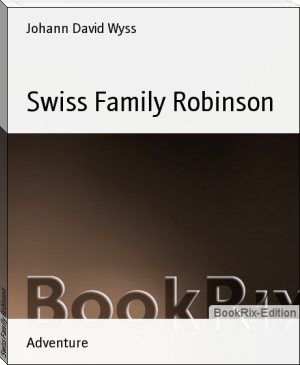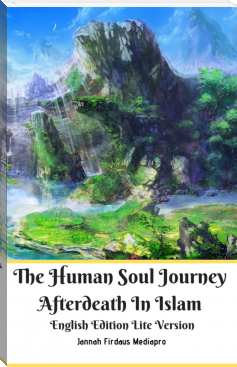Swiss Family Robinson - Johann David Wyss (poetry books to read txt) 📗

- Author: Johann David Wyss
- Performer: -
Book online «Swiss Family Robinson - Johann David Wyss (poetry books to read txt) 📗». Author Johann David Wyss
of the dress.
The garment we produced was most curious in appearance, and I must own
that I doubted its efficiency. It was like a double waistcoat, made of
linen prepared with a solution of india-rubber, the seams being
likewise coated with caoutchouc, and the whole rendered perfectly
airtight. We so arranged it that one little hole was left, by means of
which air could be forced into the space between the outer covering and
the lining, and the dress inflated.
Meanwhile I perceived with pleasure the rapid vegetation the climate
was producing. The seeds we had scattered had germinated, and were now
promising magnificent crops. The verandah, too, was looking pleasant
with its gay and sweet-scented creepers, which were already aspiring to
the summit of the pillars. The air was full of birds, the earth seemed
teeming with life.
The dress was at length completed and Fritz, one fine afternoon,
offered publicly to prove it. We all assembled on the beach, the boy
gravely donned and inflated the garment, and amidst roars of laughter
from his brothers, entered the water. Quickly and easily he paddled
himself across the bay towards Shark Island, whither we followed in one
of our boats.
The experiment was most successful, and Ernest, Jack and Franz, in
spite of their laughter at their brother’s garment, begged their mother
to make for each of them a similar dress.
While on the island we paid a visit to the colonists whom we had
established there the previous autumn. All were well; we could
perceive by the footprints that the antelopes had discovered and made
use of the shelter we had erected for them, and feeling that we could
do nothing more we scattered handfuls of maize and salt, and strolled
across to the other side of the island.
The shore was covered with lovely shells, many of which, with
beautiful pieces of delicate coral, the boys collected for their
museum; strewn by the edge of the water too lay a great quantity of
seaweed of various colours, and as the mother declared that much of it
was of use, the boys assisted her to collect it and store it in the
boat.
As we pulled back to the land I was surprised to see that my wife
chose from among the seaweed a number of curious leaves with edges
notched like a saw. When we reached home she carefully washed these and
dried them in the oven. There was evidently something mysterious about
this preparation and my curiosity at length prompted me to make an
attempt to discover the secret.
`Are these leaves to form a substitute for tobacco?’ said I. `Do you so
long for its refreshing smell?’
My wife smiled, for her dislike of tobacco was well known, and she
answered in the same jocular tone:
`Do you not think that a mattress stuffed with these leaves would be
very cool in summer?’
The twinkle in her eyes showed me that my curiosity must still remain
unsatisfied, but it nevertheless became greater than ever.
The boys and I had one day made a long and fatiguing expedition, and,
tired out, we flung ourselves down in the verandah. As we lay there
resting, we heard the mother’s voice:
`Could any of you enjoy a little jelly?’ She presently appeared,
bearing a porcelain dish laden with most lovely transparent jelly. Cut
with a spoon and laid before us it quivered and glittered in the light.
`Ambrosia!’ exclaimed Fritz, tasting it. It was indeed delicious, and,
still marvelling from whence my wife could have obtained a dish so
rare, we disposed of all that she had set before us.
`Aha,’ laughed my wife, `is not this an excellent substitute for
tobacco, far more refreshing than the nasty weed itself. Behold the
produce of my mysterious seaweed.’
`My dear wife,’ exclaimed I, `this dish is indeed a masterpiece of
culinary art, but where had you met with it? What put it into your
head?’
`While staying with my Dutch friends at the Cape,’ replied she,
`I often saw it, and at once recognized the leaves on Shark Island.
Once knowing the secret, the preparation of the dish is extremely
simple: the leaves are soaked in water, fresh every day, for a week,
and then boiled for a few hours with orange juice, citron and sugar.’
We were all delighted with the delicacy, and thanked my wife for it
most heartily, the boys declaring that they must at once go off again
to the island to collect as many of the leaves as they could find. I
agreed to accompany them, for I wished to examine the plantations we
had made there.
All were flourishing, the palms and mangroves had shot up in a most
marvellous manner, and many of the seeds which I had cast at random
amongst the clefts in the rocks had germinated, and promised to clothe
the nakedness of the frowning boulders.
A way up among the rocks too we discovered a bright sparkling spring of
delicious water, at which, from the footprints around, we saw that the
antelopes must have refreshed themselves.
Finding everything so satisfactory, we were naturally anxious to
discover how our colony and plantations on Whale Island had fared. It
was evident at a glance that the rabbits had increased, the young and
tender shoots of the trees bore the marks of many greedy mischievous
little teeth. The cocoanut palms alone had they spared.
Such depredations as these could not be allowed, and with the help of
the boys I erected round each stem a hedge of prickly thorn, and then
prepared again to embark; before we did so, however, I noticed that
some of the seaweed had also been gnawed by the rabbits, and wondering
what it could have been to tempt them, I collected some of it to
examine more fully at home.
The skeleton of the whale, too, attracted our attention, for picked
clean by the birds and bleached by sun and rain the bones had been
purified to a most perfect whiteness. Thinking that the joints of the
vertebrae might be made of use, I separated some ten or twelve, and
rolled them down to the boat, and then returned to the shore, towing
them after us.
A scheme now occupied my mind for the construction of a crushing
machine which would prove of the greatest service to us. I knew that to
make such a machine of stone was far beyond my power, but it had struck
me that the vertebrae of the whale might serve my purpose.
I determined next morning to look out a tree from which I might cut the
blocks of wood that I should require to raise my crushers.
My expedition was destined to be a solitary one, for when I went to the
stables for a horse, I discovered that the boys had gone off by
themselves with their guns and traps, and had left to me a choice
between the bull and buffalo.
With Storm, therefore, I was fain to be content. I crossed the bridge,
but as I reached the cassava field I noticed to my great annoyance that
it had been overrun and laid waste by some mischievous animals. I
examined the footprints, and seeing that they greatly resembled those
of pigs, determined to follow the trail, and see who these invaders of
our territory would prove to be.
The track led me on for some way until I almost lost sight of it near
our old potato field. For some time I hunted backwards and forwards
without seeing a sign of the animals; at length a loud barking from
Floss and Bruno, who were with me, announced that they had been
discovered.
The whole family of our old sow, and she herself, were standing at bay,
showing their teeth and grunting so savagely, that the dogs feared to
approach them.
I raised my gun and fired twice amongst the herd: two of the pigs
fell, and the rest fled, followed by the dogs. I picked up the pigs,
and calling back the pursuers, continued my way through the forest.
A tree suited to my purpose was soon found; I marked it, and returned
home.
Ernest, who had remained at home, assisted me to flay the young
porkers, and I handed them over to my wife to prepare for supper; by
which time I hoped the other lads would have returned.
Late in the evening we heard the sounds of trampling hoofs, and
presently Jack appeared, thundering along upon his two-legged steed,
followed in the distance by Fritz and Franz. These latter carried upon
their cruppers game-bags, the contents of which were speedily
displayed: four birds, a kangaroo, twenty muskrats, a monkey, two
hares and half a dozen beaver rats, were laid before me. Besides these,
Fritz threw down, without a word of explanation, a bundle of thistles.
The boys seemed almost wild with excitement at the success of their
expedition, and presently Jack exclaimed:
`Oh, father, you can’t think what grand fun hunting on an ostrich is;
we flew along like the wind; sometimes I could scarcely breathe, we
were going at such a rate, and I was obliged to shut my eyes because of
the terrific rush of air; really, father, you must make me a mask with
glass eyes to ride with, or I shall be blinded one of these fine days.’
`Indeed!’ replied I, `I must do no such thing.’ `Why not?’ asked he,
with a look of amazement upon his face.
`For two reasons: firstly, because I do not consider that I must do
anything that you demand; and, secondly, because I think that you are
very capable of doing it yourself. However, I must congratulate you
upon your abundant supply of game; you must have indeed worked hard.
`Yet I wish that you would let me know when you intend starting on such
a long expedition as this; you forget that though you yourselves know
that you are quite safe, and that all is going on well, yet that we at
home are kept in a constant state of anxiety. Now, off with you, and
look to your animals, and then you may find supper ready.’
Presently the boys returned, and we prepared for a most appetizing meal
which the mother set before us.
While we were discussing the roast pig, and washing it down with
fragrant mead, Fritz described the day’s expedition.
They had set their traps near Woodlands, and had there captured the
muskrats, attracting them with small carrots, while with other traps,
baited with fish and earthworms, they had caught several beaver rats,
and a duck-billed platypus. Hunting and fishing had occupied the rest
of the day, and it was with immense pride that Jack displayed the
kangaroo which he had run down with his swift courser.
Contributions to the garden had not been forgotten, and Fritz handed
over to his mother several cuttings from cinnamon and sweet-apple
trees. Finally, when all the other treasures had been displayed, Fritz
begged me to examine his thistles which he had gathered, thinking, he
said, that it was a plant used in the manufacture of wool.
He was perfectly right, for I recognized it at once as the `fuller’s
teazle’, a plant whose sharp little thorns, which cover the stem and
leaves, are used to raise the nap of cloth. We resolved to be up
betimes the following morning, that we might attend to the preparation
of the booty, and as I now noticed that the boys were all becoming
extremely drowsy, I closed the day with evening devotions.





Comments (0)